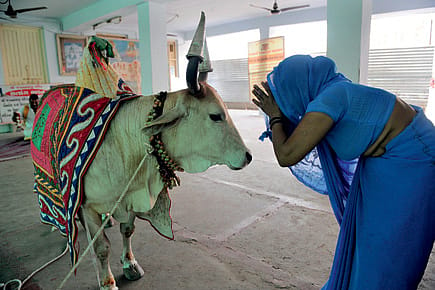What Where and Cow

Every ban on cattle slaughter is an exercise in constitutional hypocrisy
In Kerala, every village will have a corner shop selling beef curry, and, if you are not conditioned into being revolted by it, the combination with parantha is delicious. In the Northeast and Goa, beef is available at will. In many parts of India, you have to search for beef but will get it in areas of sizeable Christian and Muslim population. Many, a huge number of Hindus included, lead harmless, satiated beef-eating lives.
This week, the President gave assent to a bill that allows anyone slaughtering cattle in Madhya Pradesh to be put into jail for seven years. It’s like an anti-terrorism law. Were the police to barge in and charge you with cow slaughter, you have to prove you didn’t do it. (As an aside, the BJP tried to bring this in under the anti-terrorism law, Pota, when it was in power at the Centre).
India’s post-Independence legal relationship with the cow has been bizarre. A paper ‘Negotiating the ‘Sacred’ Cow: Cow Slaughter and the Regulation of Difference in India’ by Shraddha Chigateri went into some depth over the question. It reveals an extraordinary self-deception by the makers of our Constitution.
It’s self-evident that cow slaughter laws exist as a right-wing service to ‘Hinduism’. Madhya Pradesh has a BJP government. Rajasthan, which has a 10-year jail sentence for cow slaughter, is another Hindu right-wing stronghold. But there’s a catch. Laws cannot be made unless there is a basis for them in the Constitution. The right to make a law banning cow slaughter comes from Article 48, a directive principle, which says, ‘The State shall endeavour to organise agriculture and animal husbandry on modern and scientific lines and shall, in particular, take steps for preserving and improving the breeds, and prohibiting the slaughter, of cows and calves and other milch and draught cattle.’ Cow protection, a purely emotional and medieval concept, is therefore bizarrely clubbed with the promotion of modernism and science.
It's A Big Deal!
30 Jan 2026 - Vol 04 | Issue 56
India and European Union amp up their partnership in a world unsettled by Trump
You can thank the dynamics of politics for it. When the Constitution was being framed, powerful Hindu right-wingers, led by Rajendra Prasad, insisted on a ban. Nehru and Ambedkar were vehemently opposed, since it went against India’s secular status. So, what we got was what we are famous for: the middle path, which makes no sense.
